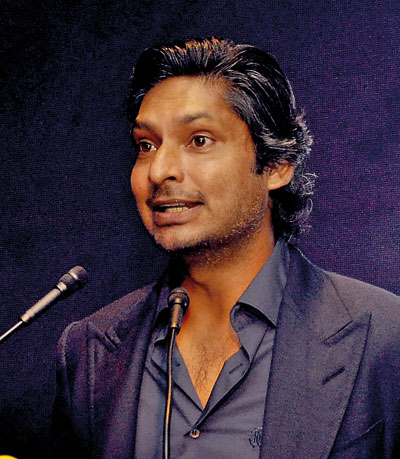Sunday Times 2
Master class
As HSBC’s Mark Prothero put it, “A great Sri Lankan, doing great things in Great Britain, deserves a great party.” If nothing else, your correspondent’s headache at the time of writing suggests that that design was amply fulfilled.
Under the aegis of the Council for Business with Britain (CBB) –Sarah Hulton OBE, the British High Commissioner in attendance – the evening with Kumar Sangakkara (KS) was a sold-out, smart-caš affair in the Shangri-La’s new, shiny Lotus Ballroom, liberally fuelled with wine, arrack and, my wife was extremely pleased to note, good cheese.

Kumar Sangakkara speaking at the event. Pic by Priyantha Wickramaarachchi
The night was MC’d by KS’s Old Trinitian pal Tharanga Gunasekera, who double-hats as part of HSBC’s corporate social responsibility wing. Mark Prothero spoke on behalf of CBB’s English Language Teacher Training Project (to which the evening’s proceeds were donated). And then came Kushil Gunasekera, head of the Foundation of Goodness/MCC Centre for Excellence at Seenigama (and no slouch himself when it comes to playing cricket).
“I really don’t know why Kumar Sangakkara has to be introduced…” he began, adroitly – and then he did the needful anyway, with particular focus on the 30-odd ‘phenomenal records’ KS has broken and in many cases still holds.
Terms like ‘legend’ and ‘icon’ are bandied about quite freely in the sporting sphere; but it is hard to be too cynical in Sangakkara’s case.
Against the massive context of his long sporting career (cricket’s not even the only sport he’s played at international level), I was amused to note that his final, stellar three seasons with Surrey in the County Championship were, I think – did I mention the wine? – not even mentioned. KS has made it very, very big indeed, whatever his own father may claim; and now on top of all his cricketing records – World Cup centuries, huge partnerships, about a million takes behind the stumps – he has become the first (and by some distance youngest) non-British President of the MCC: an achievement of genuine international importance.
Thankfully, the man introduced to us as “the most polished, graceful, elegant, prudent batsman in cricket” is also those things when it comes to public speaking too.
I first heard him speak at an international-school assembly in 2004/5. He’d only fairly recently become a big name, and the kids flocked around him, sure enough; but what I remembered from that speech was that he said he’d come to cricket ‘late’, and that he didn’t seem to think it was his sole purpose in life. I know some village cricketers who have yet to attain that much enlightenment.
Fifteen years later there were a few kids in the room, and, especially in a country where “cricket is the yardstick of normalcy,” it would have been good for them to hear him still talking about the importance of keeping your feet on the ground (not a batting tip); of the contributions made by friends and mentors; to quote ideas from various walks of life: advice from priests, a documentary about Sri Lankan rivers, Heraclitus. (And all from little more than notes, apparently. Does he have a speech-writer? If not, he doesn’t seem to need one.)
What’s more, he did all this with a pervasive modesty and humour (“I was very happy to be a part [NB] of Sri Lanka’s growth in international cricket”), and while talking up his country. He took the MCC job on the condition that he could do it properly while still largely based here – “I am a Sri Lankan. My home is here, my heart is here.” – and his first act as President was to hand out the new year’s batch of scholarships at Seenigama.
This is a man who allegedly has no trophies or awards in his house, and it is said he often gives them away the same day that he gets them. (The CBB knowingly presented him with a replica of the Lord’s bell… before the frankly lustful gaze of many audience members.) You could get carried away with phrases like “it’s an honour just to be in the same room with him”, but given that was literally what all those gathered there had paid for, I suppose it’s not all that ridiculous
The more he spoke about giving and charity and sacrifice, the more the hubbub rose around the fringes of the room, of course. His closing lines, though, seemed entirely indicative of the man. “All of us think that we can change the world. We always think that we are doing great things. But the greatest thing that you can do to change the world is to change lives. Because through that, and through those lives you change, maybe one of them will change the world for you.”
At most of these ‘evening with’ events, you don’t get closer than about 10m to the personality in question. But, once his speech was done, KS cheerfully stood and smiled for several hundred photographs, and even worked the room a little. He could have easily avoided this; but didn’t. It was a masterclass in, well, class.

